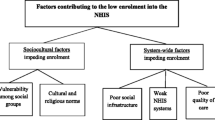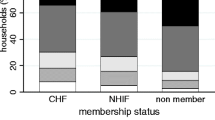Abstract
In South Africa, anticipated health sector reforms aim to achieve universal health coverage for all citizens. Success will depend on social solidarity and willingness to pay for health care according to means, while benefitting on the basis of their need. In this study, we interviewed 1330 health and education sector civil servants in four South African provinces, about potential income cross-subsidies and financing mechanisms for a National Health Insurance. One third was willing to cross-subsidize others and half favored a progressive financing system, with senior managers, black Africans, or those with tertiary education more likely to choose these options than lower-skilled staff, white, Indian or Asian respondents, or those with primary or less education. Insurance- and health-status were not associated with willingness to pay or preferred type of financing system. Understanding social relationships, identities, and shared meanings is important for any reform striving toward universal coverage.


Similar content being viewed by others
References
Carrin, G., Mathauer, I., Xu, K. and Evans, D.B. (2008) Universal coverage of health services: Tailoring its implementation. Bulletin of the World Health Organization 86 (11): 857–863.
World Health Organization. (2010) The World Health Report – Health Systems Financing: The Path to Universal Coverage. Geneva, Switzerland: World Health Organization.
African National Congress. (2010) National Health Insurance: ANC National General Council, Additional Discussion Documents. Durban, South Africa: African National Congress.
Coovadia, H., Jewkes, R., Barron, P., Sanders, D. and McIntyre, D. (2009) The health and health system of South Africa: Historical roots of current public health challenges. Lancet 374 (9692): 817.
Balabanova, D. and McKee, M. (2004) Reforming health care financing in Bulgaria: The population perspective. Social Science & Medicine 58 (4): 753–765.
Nagy, R. (2002) Reconciliation in post-commission South Africa: Thick and thin accounts of solidarity. Canadian Journal of Political Science 35 (2): 323–346.
Taylor-Gooby, P. and Martin, R. (2010) Fairness, equality and legitimacy: A qualitative comparative study of Germany and the UK. Social Policy & Administration 44 (1): 85–103.
Ullrich, C.G. (2002) Reciprocity, justice and statutory health insurance in Germany. Journal of European Social Policy 12 (2): 123–136.
Kenny, N.P., Sherwin, S.B. and Baylis, F.E. (2010) Re-visioning public health ethics: A relational perspective. Canadian Journal of Public Health 101 (1): 9–11.
Lefko-Everett, K. (2009) Jangling Discords or a Beautiful Symphony? Cape Town, South Africa: Institute for Justice and Reconciliation.
Roberts, B., wa Kikulu, M. and Davids, Y.D. (2010) South African Social Attitudes Second Report: The Age of Hope. Cape Town: Human Sciences Research Council Press.
McIntyre, D., Goudge, J., Harris, B., Nxumalo, N. and Nkosi, M. (2009) Prerequisites for national health insurance in South Africa: Results of a national household survey. South African Medical Journal 99 (10): 725–729.
Shisana, O., Rehle, T., Louw, J., Zungu-Dirwayi, N., Dana, P. and Rispel, L.C. (2006) Public perceptions on national health insurance: Moving towards universal health coverage in South Africa. South African Medical Journal 96 (9): 814–818.
GEMS: Government Employees Medical Scheme. (2010) Fact sheet, http://www.gems.gov.za, accessed 2 December 2010.
Lee, S.Y., Suh, N.K. and Song, J.K. (2009) Determinants of public satisfaction with the national health insurance in South Korea. International Journal of Health Planning and Management 24 (2): 131–146.
Gilson, L. (1995) Health sector reforms in sub-Saharan Africa: Lessons of the last 10 years. Health Policy 32 (13): 215–243.
McIntyre, D. and Gilson, L. (2000) Redressing dis-advantage: Promoting vertical equity within South Africa. Health Care Analysis 8 (3): 235–258.
Kirkwood, B.R. and Sterne, J.A.C. (2003) Essential Medical Statistics, 2nd edn. Oxford: Blackwell Publishing Limited.
Bewaji, J.A.I. and Ramose, M.B. (2003) The Bewaji, Van Binsbergen and Ramose debate on Ubuntu. South African Journal of Philosophy 22 (4): 378–415.
Forman, L. (2008) Justice and justiciability: Advancing solidarity and justice through South Africans’ right to health jurisprudence. Medical Law 27 (3): 661–683.
Costandius, E. (2009) Independent and interdependent concepts of self: A meeting of worlds. Acta Academica 41 (2): 158–179.
Krosnick, J.A. (1999) Survey research. Annual Review of Psychology 50 (1): 537.
McIntyre, D. (2010) Private Sector Involvement in Funding and Providing Health Services in South Africa: Implications for Equity and Access to Health Care. Harare, Zimbabwe: EQUINET.
Kikuzawa, S., Olafsdottir, S. and Pescosolido, B.A. (2008) Similar pressures, different contexts: Public attitudes toward government intervention for health care in 21 nations. Journal of Health and Social Behavior 49 (4): 385–399.
Mann, C.J. (2003) Observational research methods. Research design II: Cohort, cross sectional, and case-control studies. Emergency Medicine Journal 20 (1): 54–60.
Wong, J. (2005) Adapting to democracy: Societal mobilization and social policy in Taiwan and South Korea. Studies in Comparative International Development 40 (3): 88–111.
Commission on Social Determinants of Health. (2008) Closing the Gap in a Generation. Health Equity Through Action on the Social Determinants of Health. Geneva, Switzerland: World Health Organization.
Acknowledgements
We would like to thank Diane McIntyre for her conceptual input into the design of the social solidarity-related survey questions and framework underpinning this article. This research was funded by the International Development Research Centre (IDRC) (Grant number 103457) and the European Commission (Sixth Framework Programme; Specific Targeted Research Project no: 32289).
Author information
Authors and Affiliations
Corresponding author
Additional information
This paper examines the willingness of South African civil servants to cross-subsidize the health care costs of others. The authors recommend that health sector reforms must consider social relationships, and identities, as well as technical and financing details.
Rights and permissions
About this article
Cite this article
Harris, B., Nxumalo, N., Ataguba, J. et al. Social solidarity and civil servants’ willingness for financial cross-subsidization in South Africa: Implications for health financing reform. J Public Health Pol 32 (Suppl 1), S162–S183 (2011). https://doi.org/10.1057/jphp.2011.23
Published:
Issue Date:
DOI: https://doi.org/10.1057/jphp.2011.23




